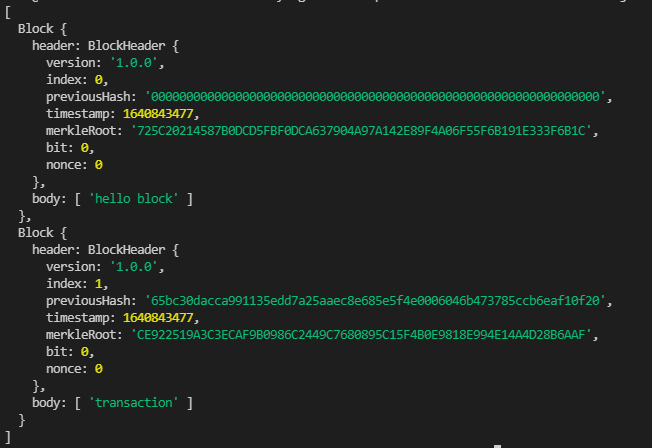필요한 모듈
crypto-jsfsmerkle
모듈 불러오기 및 선언
// chainedBlock.js
// 모듈 불러오기
const cryptojs = require('crypto-js')
const fs = require('fs')
const merkle = require('merkle')블럭 클래스 생성
// 블록 클래스 생성
class Block{
constructor(header, body){
this.header = header
this.body = body
}
}
// 블록 헤더 클래스 생성
class BlockHeader{
constructor(version, index, previousHash,timestamp,merkleRoot,bit,nonce){
this.version = version
this.index = index
this.previousHash = previousHash
this.timestamp = timestamp
this.merkleRoot = merkleRoot
this.bit = bit
this.nonce = nonce
}
}앞선 포스트에서 말했듯이 블록은 header와 body로 나뉘어져 있습니다.
먼저 Block 클래스에서 header와 body를 초기화해주고
다음 BlockHeader 클래스에서 header에 들어갈 인스턴스 객체들을 초기화 해주었습니다. ( 아마 이 BlockHeader가 Block의 header에 들어가겠죠?)
초기 블록을 만들어 보자
// 제네시스 블록 만들기 ( 제일 초기의 블록 )
function createGenesisBlock() {
const version = getVersion(); // 해당 코인의 현재 버전
const index = 0; // 현재 블록의 인덱스
const previousHash = "0".repeat(64); // 이전 블록의 Hash값 ( 초기의 블록이기 때문에 0000...00)
const timestamp = parseInt(Date.now() / 1000); // 현재 시간 ( 초 단위 )
const body = ["genesis block!"]; // 블록의 body부분
const tree = merkle("sha256").sync(body); // body부분을 트리로 변경
const merkleRoot = tree.root() || "0".repeat(64); // tree의 root hash값. 없으면 기본 0 x 64개
const bit = 0; // 초기 0 bit
const nonce = 0; // 초기 nonce 0
}
function getVersion() {
const package = fs.readFileSync("package.json"); // package.json 파일 불러오기
return JSON.parse(package).version; // JSON 파싱해서 package에 들어있는 key중 version이라는 key의 값 반환
}getVersion() 함수를 만들어서 version 값을 넣어줬습니다!
let Blocks = [createGenesisBlock()]이후 Blocks배열을 만들어서 해당 배열에 첫 블록을 넣어주었습니다.
get 접근자 함수를 만들어서 return 해주겠습니다.
function getBlocks(){
return Blocks
}
function getLastBlock(){
return Blocks[Blocks.length-1]
}다음 블록 만들기
- 다음 블록을 만들기 위해서는 현재 블록의 해시 값을 구해야 합니다.
- 현재 블록의 해시 값은
version, index, previousHash, timeStamp, merkleRoot, bit, nonce의 값을 모두 더해서 구한 다고 하였습니다.
function createHash(data){
const {version,index, previousHash, timestamp, merkleRoot, bit, nonce} = data.header // 헤더의 데이터를 가져와서
const blockString = version + index + previousHash + timestamp + merkleRoot + bit + nonce // 모두 더한다
const hash = cryptojs.SHA256(blockString).toString() // 해시화
return hash // 리턴
}- 해시 값을 리턴 해주므로 이제 다음 블록을 만드는 함수를 만들어 보도록 하겠습니다.
function nextBlock(bodyData){
const prevBlock = getLastBlock() // 다음 블록은 마지막 블록 뒤에 이어지므로
const version = getVersion() // 버전 가져오기
const index = prevBlock.header.index + 1 // 이전 블록 인덱스 + 1
const previousHash = createHash(prevBlock) // 이전 블록 해시
const timestamp = parseInt(Date.now() / 1000) // 초 단위 타임스탬프
const tree = merkle('sha256').sync(bodyData) // 트리 생성
const merkleRoot = tree.root() || '0'.repeat(64) // 머클 트리 루트 값
const bit = 0 // 비트
const nonce = 0 // 논스
const header = new BlockHeader(version, index, previousHash, timestamp, merkleRoot, bit, nonce)
// BlockHeader header 블록에 상단 정보들 넣어주기
return new Block(header, bodyData)
// Block 반환
}
// 매개변수로 body 값 넣어서 Block 배열에 push
function addBlock(bodyData){
const newBlock = nextBlock(bodyData)
Blocks.push(newBlock)
}
전체코드
const cryptojs = require('crypto-js')
const fs = require('fs')
const merkle = require('merkle')
class Block{
constructor(header, body){
this.header = header
this.body = body
}
}
class BlockHeader {
constructor (version, index, previousHash, timestamp, merkleRoot, bit, nonce){
this.version = version
this.index = index
this.previousHash = previousHash
this.timestamp = timestamp
this.merkleRoot = merkleRoot
this.bit = bit
this.nonce = nonce
}
}
function getVersion() {
const package = fs.readFileSync("package.json")
return JSON.parse(package).version
}
function createGenesisBlock() {
const version = getVersion()
const previousHash = '0'.repeat(64)
const timestamp = parseInt(Date.now()/1000)
const body = ['hello block']
const tree = merkle('sha256').sync(body)
const merkleRoot = tree.root() || '0'.repeat(64)
const bit = 0
const nonce = 0
const index = 0
const header = new BlockHeader(version, index, previousHash, timestamp, merkleRoot, bit, nonce)
return new Block(header, body)
}
let Blocks = [createGenesisBlock()]
function getBlocks(){
return Blocks
}
function getLastBlock(){
return Blocks[Blocks.length-1]
}
function createHash(data){
const {version,index, previousHash, timestamp, merkleRoot, bit, nonce} = data.header
const blockString = version + index + previousHash + timestamp + merkleRoot + bit + nonce
const hash = cryptojs.SHA256(blockString).toString()
return hash
}
function nextBlock(bodyData){
const prevBlock = getLastBlock()
const version = getVersion()
const index = prevBlock.header.index + 1
const previousHash = createHash(prevBlock)
const timestamp = parseInt(Date.now() / 1000)
const tree = merkle('sha256').sync(bodyData)
const merkleRoot = tree.root() || '0'.repeat(64)
const bit = 0
const nonce = 0
const header = new BlockHeader(version, index, previousHash, timestamp, merkleRoot, bit, nonce)
return new Block(header, bodyData)
}
function addBlock(bodyData){
const newBlock = nextBlock(bodyData)
Blocks.push(newBlock)
}
addBlock(['transaction'])
const blockChain = getBlocks()
console.log(blockChain)